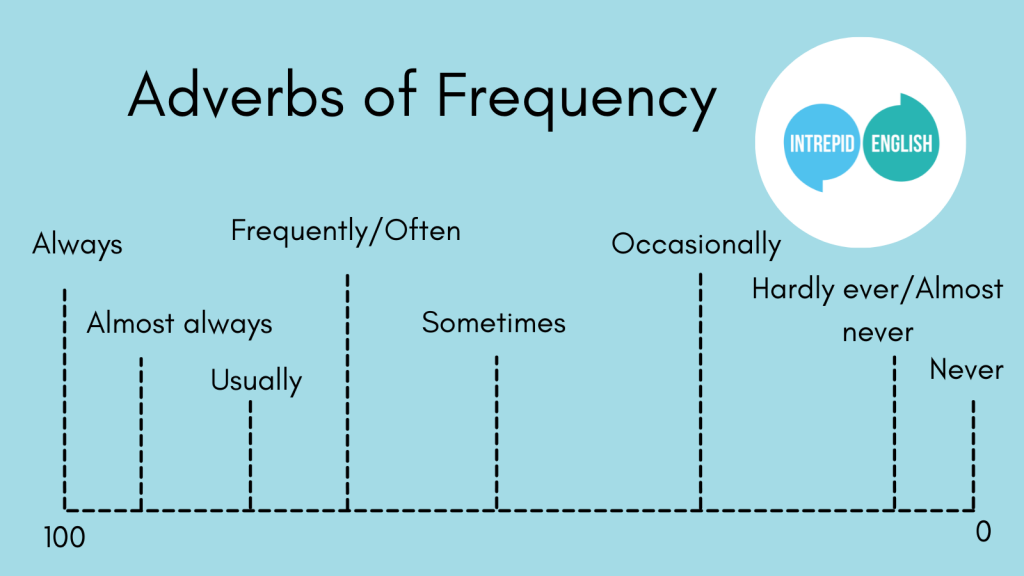In today’s blog post, I am going to explain what exactly adverbs of frequency are, and how to use them. This blog post is the second in a series of blog posts all about adverbs! If you haven’t already, make sure you check out part one, where Tom explains some common adverbs of place and how to use them, and stay tuned for more adverb blog posts coming soon.
What is an adverb?
An adverb is a word which modifies or qualifies a verb, adjective, or other adverb. For example: “He always drinks tea in the mornings.” In this example, always is the adverb. It modifies the verb, drink, and tells us how often the subject does this action.
What are adverbs of frequency?
An adverb of frequency describes just that – how frequently, how often, or how many times we do something.
Let’s take a look at some adverbs of frequency and some example sentences. As a general rule, we place adverbs of frequency before the main verb, but if we are using the verb to be the adverb of frequency goes after the verb to be.
Always
They always clean the house on Sundays.
Do you always eat cereal for breakfast?
Almost always
He is almost always late to class.
Usually
I usually take the bus to school.
Do you usually go swimming on weekends?
Often/Frequently
We often bump into Sam working at this café.
They are frequently tired in the mornings, because they almost always go to bed late.
Sometimes
I sometimes eat pancakes for breakfast.
Occasionally
I occasionally misplace my keys.
Hardly ever/Almost never
She hardly ever eats meat.
Never
I have never seen that movie.

Adverbial expressions
We can also use some adverbial expressions to describe how often we do something.
Once/twice/three times a day/week/month/year etc.
Jake goes to basketball practice three times a week.
The dogs eat twice a day.
Oli doesn’t really like clubbing. He only goes out once in a blue moon.
Every day/week/month/year
George speaks to his parents every day.
The employees are paid every month.
Much/a lot
We use a lot in affirmative sentences, and both a lot and much in negative sentences.
They love this restaurant. They eat here a lot.
We don’t go to the cinema much. We prefer to watch movies at home.
Asking questions with adverbs of frequency
We can use several adverbs of frequency in questions.
We use always, usually, and sometimes between the subject and the main verb.
Do you always go to this yoga class?
Do you usually finish work at 5pm?
Do they sometimes order takeaway?
We can use often, much or a lot at the end of a question.
Does she forget her homework often?
Do they go to the gym a lot?
Do you go running much?
Ever
To ask if an action has taken place or takes place regularly, we can ask questions with ever. Ever is often used with the present perfect tense.
Have you ever eaten Mexican food?
Have you ever visited Europe?
Do you ever daydream at work?
How often…?
If we want to ask for the frequency of an action we ask with ‘How often…?’
How often do you see your cousins?
Not very often. I see them once or twice a year.
How often is this programme on?
It’s on a lot! Every night at 7pm.
How often do you eat at this restaurant?
Not much. We occasionally eat here on special occasions.
Adverbs of Frequency Exercise:
Fill in the sentences below with a suitable adverb or adverbial expression.
- We should have gotten up earlier. We are ______ late for our flights! It’s so stressful!
- I didn’t go out ____ before the pandemic, but now I am craving a party!
- The dentist recommends that you brush your teeth ______.
- You have to pay your phone bill ______, otherwise the line will be cut off.
- I like jazz music, but I _____ listen to rock too.
- Have you ____ been to Paris?
- The neighbourhood is very safe. There are _____ any reports of crime.
- We ______ go to Portugal for our summer holidays. We love it there.
- ______ do you get your hair cut?
- Do you ______ come to this restaurant on your anniversary?
Post your answers in the comments section below and an Intrepid English Teacher will get back to you.
Learn more about adverbs in the Fast Grammar course in the Intrepid English Academy. Not an Intrepid English Member yet? Book a trial lesson today and talk to an experienced and friendly Intrepid English teacher and find out if online English lessons are for you.
